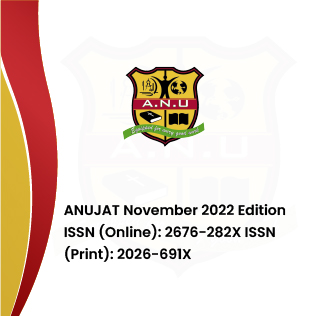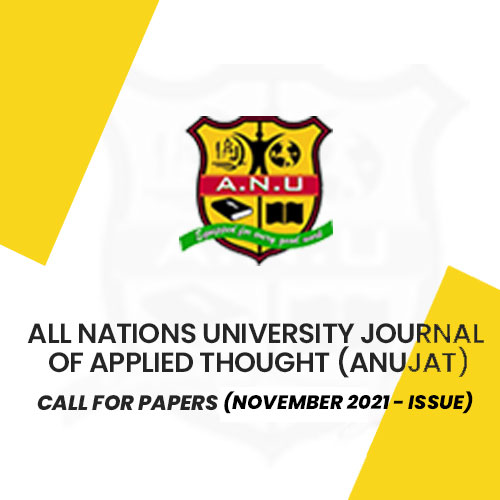High visibility
ANUJAT’s open access policy allows maximum visibility of articles published in the journal as they are available to a wide, global audience.
Speed of publication
ANUJAT offers a fast publication schedule whilst maintaining rigorous peer review; all articles must be submitted online, and peer review is managed fully electronically (articles are distributed in PDF form, which is automatically generated from the submitted files). Articles will be published with their final citation after acceptance, in both fully browsable web form, and as a formatted PDF; the article will then be available through All Nations University website.
Flexibility
Online publication in ANUJAT gives you the opportunity to publish large datasets, large numbers of color illustrations and moving pictures, to display data in a form that can be read directly by other software packages so as to allow readers to have access to relevant information.
Promotion and press coverage
Articles published in ANUJAT are included in article alerts, regular email updates, hard copies are printed and distributed to readers in November every year, during All Nations University Graduation Ceremony. Hard copies are also distributed to some selected Universities’ libraries around the globe.
In addition, articles published in ANUJAT may be promoted by press releases to the general press. These activities increase the exposure and number of accesses for articles published in ANUJAT. It will be also be published online.
Copyright
Authors of articles published in ANUJAT retain the copyright of their articles and are free to reproduce and disseminate their work (for further details, see the copyright and license agreement).
Open access
All articles published by the ANUJAT are made freely and permanently accessible online immediately upon publication, without subscription charges or registration barriers. Further information about open access can be found here.
As authors of articles published in the ANUJAT you are the copyright holders of your article and have granted to any third party, in advance and in perpetuity, the right to use, reproduce or disseminate your article, according to the ANUJAT copyright and license agreement.
For those of you who are US government employees or are prevented from being copyright holders for similar reasons, ANUJAT can accommodate non-standard copyright lines. Please contact us if further information is needed.
Article-processing charges
No publication charge. Open access publishing is not without costs.
Indexing services The full text of all articles is deposited in digital archives around the world to guarantee long-term digital preservation.
We are working closely with relevant indexing services including PubMed Central and Web of Science (Clarivate Analytics) to ensure that articles published in ANUJAT will be available in their databases when appropriate. We are also working with Research Intelligence Management for Africa to rate ANUJAT for Scopus, I.F., I.S.C. and impact factor.
Peer-review policy
Peer-review is the system used to assess the quality of a manuscript before it is published. Independent researchers in the relevant research area assess submitted manuscripts for originality, validity and significance to help editors determine whether the manuscript should be published in ANUJAT. You can read more about the peer-review process here.
ANUJAT operates a double-blind peer-review system, where the reviewers do not know the names or affiliations of the authors and the reviewer reports provided to the authors are anonymous.
The benefit of double-blind peer review is that it allows reviewers to judge the manuscript based on content alone, and they are not unconsciously biased by knowledge of who the authors are. Submitted manuscripts will generally be reviewed by two or more experts who will be asked to evaluate whether the manuscript is academically sound and coherent, whether it duplicates already published work, and whether or not the manuscript is sufficiently clear for
publication. The Editors will reach a decision based on these reports and, where necessary, they will consult with members of the Editorial Board.
Editorial policies
All manuscripts submitted to ANUJAT should adhere to ANUJAT’s editorial policies. Once your article is accepted, it will be processed by production and published shortly afterwards. In some cases, articles may be held for a short period of time prior to publication. If you have any concerns or particular requirements, please contact the Assistant Editor on [email protected]
Citing articles in ANUJAT
Articles in ANUJAT should be cited in the same way as articles in other international journal. Because articles are not printed, they do not have page numbers; instead, they are given a unique article number.
Appeals and complaints
If you wish to appeal a rejection or make a complaint you should, in the first instance, contact the Editor who will provide details of the journal’s complaints procedure.




